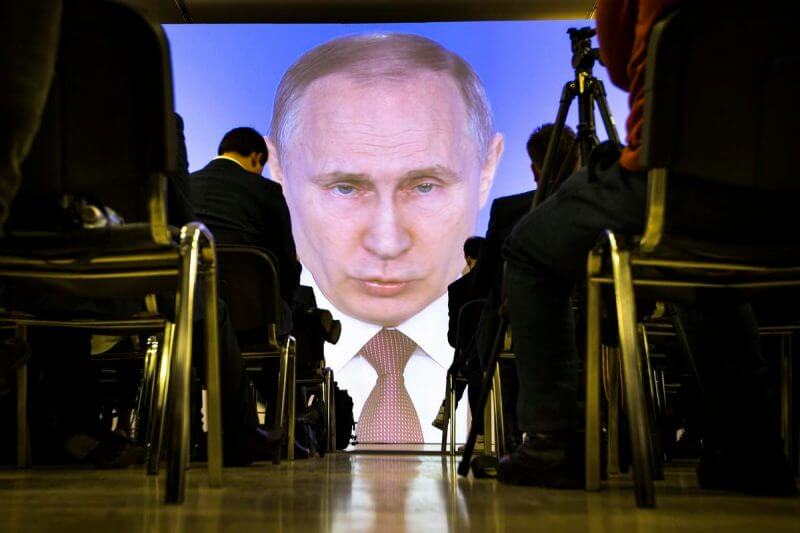This article originally appeared in the Globe and Mail.
By Marcus Kolga, April 21, 2023
On Monday, a judge in Moscow handed down the harshest penalty ever imposed on a member of the Russian pro-democracy opposition. For the crime of publicly stating his political views, Vladimir Kara-Murza was sentenced to 25 years of hard labour in a decrepit Russian gulag prison camp.
Mr. Kara-Murza was detained in April, 2022, as he told the court last week, “for speaking out against the war in Ukraine. For many years of struggle against Vladimir Putin’s dictatorship. For facilitating the adoption of personal international sanctions under the Magnitsky Act against human rights violators.” He is among more than 20,000 Russians who have been detained for speaking out against the regime over the past year.
Mr. Kara-Murza’s vision for a free and democratic Russia – one that respects the rule of law, human rights and the sovereignty of its neighbours – made him a victim of Mr. Putin’s domestic war on democracy and the truth, but it is a vision that the democratic world should support.
Like the imprisoned Russian opposition leader Alexey Navalny, Mr. Kara-Murza has been targeted for assassination not once, but twice. According to investigative journalists at Bellingcat, Mr. Kara-Murza was poisoned by the same Russian FSB hit squad that poisoned Mr. Navalny in 2020.
Despite significant neurological damage caused by the poisoning, Mr. Kara-Murza was not deterred from continuing his advocacy.
In February, 2016, less than a year he was poisoned by Kremlin agents in Moscow and still early in his recovery, I organized a series of advocacy events for Mr. Kara-Murza in Toronto and Ottawa. I hadn’t seen him since the attack, and was shocked by how frail he seemed at the time. He walked with a cane, his legs not yet recovered from nerve damage caused by the poison.
In Parliament, he yet again urged Canada to quickly adopt Magnitsky sanctioning legislation that could hold Russian human rights abusers to account. The legislation is named after Russian lawyer Sergei Magnitsky, who uncovered a US$230-million dollar tax fraud committed by Russian authorities. Vladimir Putin’s agents thanked Mr. Magnitsky for his work by detaining him for a year, during which his health was allowed to deteriorate. He died after being severely beaten by prison guards.
In a cruel twist, the same corrupt officials who Mr. Kara-Murza advocated against are now responsible for his own incarceration and sentence. Billionaire businessman and Kremlin critic Bill Browder captured it well: “It’s incredibly tragic that the same judge who ordered the detention of Sergei Magnitsky, Sergei Podoprigorov, presided over Vladimir’s sham trial, and that Sergei Magnitsky’s prison warden, Dmitry Komnov, is now Vladimir’s jailer. Like Sergei, the prison conditions are killing Vladimir.”
Mr. Kara-Murza’s wife Evgenia called his 25-year sentence “pure and cynical revenge” for his work in promoting Magnitsky legislation in Canada, the U.S., U.K. and Europe.
Russian opposition leader and chess grandmaster, Garry Kasparov, says Mr. Kara-Murza’s fate depends on the fate of the Putin regime. “The path to his freedom is readily available: give Ukraine the weapons it needs to win this war and accelerate the downfall of Putin and the liberation of all Russian political prisoners.”
As the democratic world continues to support Ukraine’s fight to repel Russia’s invasion and regain lost territories, it should be looking to a post-Putin future. It may come sooner than anyone expects.
The coming democratic era depends on Russian civil society groups, activists and independent journalists who are today struggling to avoid the Kremlin’s domestic and transnational repression.
We have an opportunity – a moral obligation – to invest in and support the growth and development of Russian civil society and independent media now, and help them prepare to succeed when the opportunity emerges for a transition to democracy.
This includes supporting brave dissidents like Mr. Kara-Murza and their families by working with our democratic allies to provide the financial and moral support these Russian heroes need to ease their stress and suffering and enable them to continue their fight. This can be achieved through the newly established “30 October Foundation,” which has been set up to support families of jailed Russian dissidents.
After Mr. Kara-Murza’s sentencing, his wife Evgenia warned that “he doesn’t have five years, let alone 25 … Now it is a question of life and death.”
It’s unlikely the democratic world will be able to bear another 25 years of Vladimir Putin. This is why we must do all we can today, to take the battle to Russia’s crypto-Stalinist kleptocrats by enabling and empowering the movement for freedom and democracy in Russia and supporting brave heroes like Vladimir Kara-Murza.
Marcus Kolga is a senior fellow at the Macdonald-Laurier Institute and leader of the Canadian civil society campaign for Magnitsky legislation.






